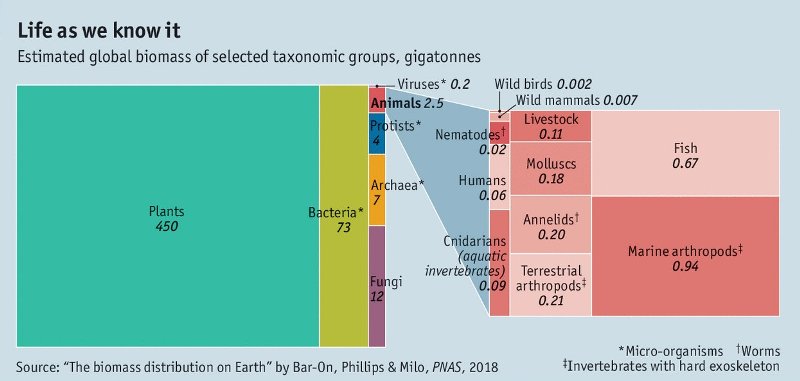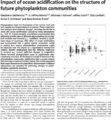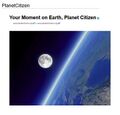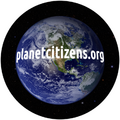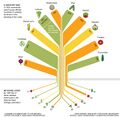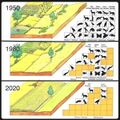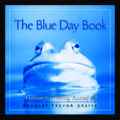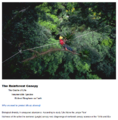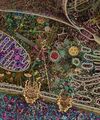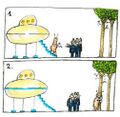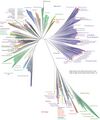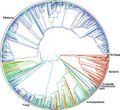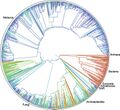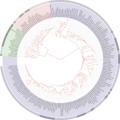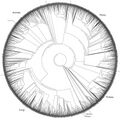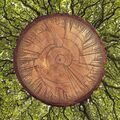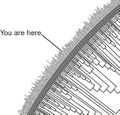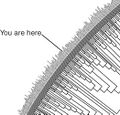Category:Biosphere
<addthis />
Biosphere: The global sum of all ecosystems. It can be termed the zone of life on Earth, a closed system (apart from solar and cosmic radiation and heat from the interior of the Earth), and largely self-regulating. By the most general biophysiological definition, the biosphere is the global ecological system integrating all living beings and their relationships, including their interaction with the elements of the lithosphere, geosphere, hydrosphere, and atmosphere.
• http://en.wikipedia.org/wiki/Biosphere
·······················································
The composition of the biosphere
Plants rule the carbon weight of the world
There are almost 8 billion people alive today. This sounds like a lot, but how do we really weigh up in comparison to other living things?
The carbon weight of all life on Earth is estimated at 550 gigatonnes, according to a recent study by the Proceedings of the National Academy of Sciences. Human beings make up only around 0.01 per cent of this biomass.
·····································
Biosphere Data via NASA 2000
- Ocean Data
• https://svs.gsfc.nasa.gov/30289
• https://svs.gsfc.nasa.gov/3938
• https://svs.gsfc.nasa.gov/cgi-bin/search.cgi?value=seawifs&expanded=filters
• https://svs.gsfc.nasa.gov/30801
- Global Biosphere, Yearly Cycle
• https://svs.gsfc.nasa.gov/vis/a030000/a030500/a030595/biosphere_cryo_720p.mp4
• https://svs.gsfc.nasa.gov/30595
• https://svs.gsfc.nasa.gov/11861
SeaWIFS full mission composite -- Ocean chlorophyll concentration averaged over the full mission – 4 Sep 1997 to 30 Nov 2010
The SeaWiFS instrument aboard the SeaStar satellite has been collecting ocean data since 1997. By monitoring the color of reflected light via satellite, scientists can determine how successfully plant life is photosynthesizing. A measurement of photosynthesis is essentially a measurement of successful growth, and growth means successful use of ambient carbon. This animation represents nearly a decade's worth of data taken by the SeaWiFS instrument, showing the abundance of life in the sea and along the Western seaboard of the United States. Dark blue represents warmer areas where there is little life due to lack of nutrients, and greens and reds represent cooler nutrient-rich areas. The nutrient-rich areas include coastal regions where cold water rises from the sea floor bringing nutrients along and areas at the mouths of rivers where the rivers have brought nutrients into the ocean from the land. The nutrient-rich waters contribute to some of the oxygen-poor pockets of the seas called dead zones.
○
Under the Earth's Surface
Life on Earth's lands and oceans and as science is beginning to discover, there is the "dark biosphere"...
○
Subcategories
This category has the following 12 subcategories, out of 12 total.
B
C
E
F
G
N
S
W
Pages in category "Biosphere"
The following 69 pages are in this category, out of 69 total.
3
C
D
E
F
G
- Generation Green
- Genesis, Stewardship and Beyond
- Global Risks Report
- Green Bank in Maryland - and More
- Green Stories of the Day
- Green Stories of the Day - GreenPolicy360 Archive
- GreenPolicy360 Archive Highlights 2013
- GreenPolicy360 Archive Highlights 2014
- GreenPolicy360 Archive Highlights 2015
- GreenPolicy360 Archive Highlights 2016
- GreenPolicy360 Archive Highlights 2017
- GreenPolicy360 Archive Highlights 2018
- GreenPolicy360 Archive Highlights 2019
- GreenPolicy360 Archive Highlights 2020
- GreenPolicy360 Archive Highlights 2023
O
P
Media in category "Biosphere"
The following 95 files are in this category, out of 295 total.
(previous page) (next page)- Pale Blue Dot - The Book by Carl Sagan 2.jpg 330 × 143; 17 KB
- Paris Climate Summit 195 Nations Challenged INDCs.png 512 × 127; 21 KB
- Peace-dove w olive-branch sm.jpg 336 × 417; 37 KB
- Planet cit s.jpg 384 × 212; 38 KB
- Planet Citizen @ParisSummit Dec1.png 570 × 87; 20 KB
- Planet of the Year Christo-Time.jpg 800 × 1,079; 175 KB
- PlanetCitizen - Your Moment on Earth.jpg 650 × 625; 80 KB
- PlanetCitizen banner.jpg 980 × 200; 31 KB
- Planetcitizens.org.png 768 × 768; 900 KB
- Planting Corals Now.jpg 800 × 365; 72 KB
- Pope Francis - 2020.jpg 316 × 480; 12 KB
- Primate Evolution - History of Our Tribe Hominini.png 524 × 800; 368 KB
- Protect the Natural World.jpg 800 × 345; 78 KB
- RACHEL CARSON - 1949.jpg 600 × 600; 102 KB
- Rachel Carson courtesy of Rachel Carson Estate.jpg 640 × 776; 264 KB
- Rachel Carson ecology - ecosystem.png 800 × 388; 0 bytes
- Rachel Carson Institute.png 800 × 522; 189 KB
- Rachel carson1 NYT-Illustration by Valero Doval.png 784 × 469; 0 bytes
- Rachel Lost Woods After Silent Spring m.png 800 × 196; 101 KB
- RedList-2010.gif 463 × 365; 10 KB
- Reefscape.png 582 × 567; 537 KB
- Remembering E.O. Wilson and Thomas Lovejoy.jpg 640 × 327; 56 KB
- Revkin - Dot Earth sign off Dec 5, 2016.png 648 × 687; 336 KB
- Robert W Kates.jpg 400 × 231; 43 KB
- Sagan - That's home.jpg 506 × 605; 54 KB
- Seed diversity-varieties.jpg 754 × 735; 119 KB
- Share GreenPolicy360.png 391 × 70; 4 KB
- Shifting Baseline Syndrome - threats to ecosystems biodiversity.png 431 × 534; 322 KB
- Shifting Baselines 2.jpg 600 × 600; 140 KB
- Sixth Mass Extinction Infograph-NYT - 2.jpg 551 × 762; 175 KB
- Sixth Mass Extinction infograph-NYT.jpg 1,626 × 2,220; 1.37 MB
- Sixth-extinction-global m.jpg 688 × 387; 167 KB
- SOBEK - OARS adventuring.png 800 × 534; 969 KB
- Soil and mycelium mycorrhizal fungi network threads.png 600 × 800; 699 KB
- Soil biodiversity.jpg 650 × 409; 230 KB
- Soil is the root stuff.jpg 483 × 960; 97 KB
- Soil-vs-dirt-infographic.jpg 887 × 578; 115 KB
- Space.2015.3.issue-1.cover.jpg 400 × 518; 65 KB
- Speed and Scale Action Plan.png 550 × 867; 132 KB
- Speed and Scale Poster.png 490 × 772; 101 KB
- St Francis at the São Paulo Zoo 2018 - wiki commons.jpg 800 × 533; 70 KB
- St Francis with the birds.jpg 305 × 394; 27 KB
- St.FrancisPreachingtotheBirds Giotto.jpg 213 × 213; 49 KB
- Stephen Hawking Genius on PBS 1.jpg 800 × 474; 77 KB
- Stephen Hawking-Genius-2016.jpg 250 × 339; 27 KB
- Steven J Schmidt, May 2023.png 363 × 484; 383 KB
- Story telling and science education.png 515 × 480; 171 KB
- StratDem logo4.png 316 × 100; 10 KB
- TEEB logo.png 400 × 400; 162 KB
- The A-Train.jpg 670 × 453; 244 KB
- The Blue Day Book.png 391 × 391; 281 KB
- The Code Breaker, Jennifer Doudna.jpg 299 × 455; 26 KB
- The Daily Puffin.png 768 × 800; 766 KB
- The Hidden Universe - Adventures in Biodiversity.png 768 × 959; 365 KB
- The Rainforest Canopy, the Richest Biosphere on Earth.png 745 × 757; 730 KB
- There is no Plan et B.png 611 × 846; 374 KB
- TimeCover2006 Be Worried.jpg 707 × 410; 140 KB
- Tiny Little Ones... Inner Life of a Cell.jpg 679 × 817; 159 KB
- To a layer of topsoil MN-SD.jpg 960 × 540; 61 KB
- Tom Lovejoy on Biological Diversity.png 594 × 180; 48 KB
- Tom Lovejoy Planet Citizen.png 594 × 257; 25 KB
- Tracking Biden's Environmental Record - WaPo - Feb 2021.jpg 766 × 326; 64 KB
- Tracking Biden's Environmental Record - WaPo listing - Feb 2021.jpg 588 × 397; 35 KB
- Tree hugging visitor.jpg 504 × 491; 34 KB
- Tree of Life Explorer - Evogeneao.png 800 × 293; 311 KB
- Tree of Life nmicrobiol201648-f1 via Nature.jpg 695 × 833; 98 KB
- Tree of Life on Hand.jpg 336 × 448; 70 KB
- Tree of Life opensourcetreeoflife m.jpg 400 × 365; 47 KB
- Tree of Life opensourcetreeoflife.jpg 800 × 730; 181 KB
- Tree of Life video.png 646 × 395; 146 KB
- Tree of Life.png 800 × 800; 404 KB
- Treeoflife.jpg 800 × 800; 161 KB
- TreeOfLifeArt s.jpg 396 × 396; 125 KB
- Union Oil Spill On the Calif Coast - February 1969.png 640 × 351; 371 KB
- Union Oil Spill On the Calif Coast - January 1969.png 640 × 326; 196 KB
- US Fossil Fuel Consumption graph 1965-2022.png 800 × 489; 86 KB
- Us-ghg-emissions-figure1-2015.png 528 × 366; 22 KB
- Value the Wetlands - UN Biodiversity Infographic 2023.jpg 633 × 900; 110 KB
- Viaggi-sanfrancesco-assisi.jpg 618 × 401; 66 KB
- Virgin Galactic Space Test Flight-April5,2018.png 563 × 305; 53 KB
- Vorsorgeprinzip at GreenPolicy360 - sjs.png 611 × 758; 164 KB
- We are all crew.jpg 448 × 181; 17 KB
- Wildflowers EarthArt.jpg 600 × 278; 79 KB
- Wildlife silence. sound ecologists warning.jpg 640 × 232; 63 KB
- World Bank Group Climate Action Plan Apr2016.png 522 × 729; 244 KB
- World Bank Group Climate Change Action Plan 2016.png 512 × 256; 167 KB
- World Oil Report - Dec2016.png 694 × 670; 203 KB
- Worldwide view of oceans phytoplankton earth observatory nasa.gif 540 × 270; 0 bytes
- Worldwide view of plankton www.phys.org.jpg 378 × 200; 138 KB
- You are here on the cladogenetic tree m.jpg 545 × 521; 73 KB
- You are here on the cladogenetic tree.jpg 1,048 × 1,002; 230 KB
- Biodiversity
- Earth Law
- Earth Science
- Ecology Studies
- Origins of Life
- Sustainability
- Externalities
- Extinction
- Geology
- Geophysics and Geochemistry
- Land Ethic
- Planet Citizen
- Planet Scientist
- Soil
- Sustainability Policies
- Atmospheric Science
- Biogeosciences
- Climate Change
- Cryosphere
- Mineralogy
- Geophysics
- Hydrology
- Natural Resources
- Ocean Science
- Planetary Science
- Space Science and Space Physics

